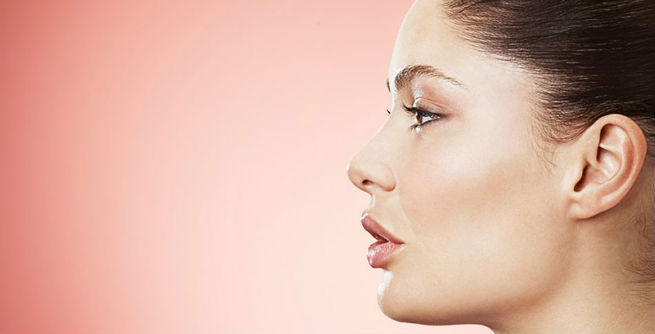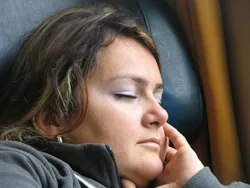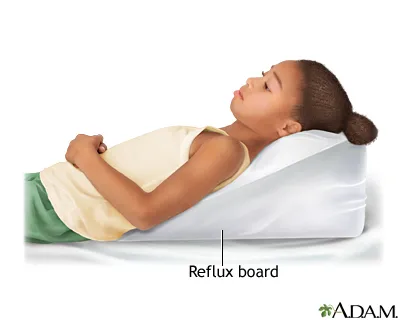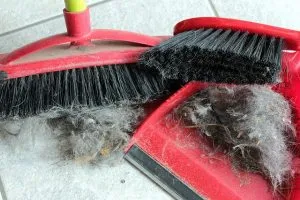Mouth Breathing Treatment: Stop Mouth Breathing with 7 Easy Everyday Tips

You’ve probably heard the joke about mouth breathers but if you are one of them, you know there is nothing funny about it. In fact, it could be a matter of life and death.
Mouth breathers are those who breathe through their mouths instead of their noses. Breathing through the mouth has negative health implications. There are those who breathe with their mouths only when they are asleep and those who do even when they are awake
How do you know if you breathe through your mouth at night?
You can easily check this by checking for dryness in the mouth immediately you wake up. If your mouth is dry, then you breathe through it in your sleep.
What causes mouth breathing?
Mouth breathing can be is as a result of either one of these:
- Nasal obstruction: There is resistance to the smooth flow of air
- It can also be habitual where you formed a habit of breathing through the mouth since you were a child
- In the third trimester of pregnancy, mouth breathing is common. However if you are not a mouth breather this will stop.
Why is it important that you breathe through your nose?
The normal anatomical function is to breathe through your nose. And there are good reasons why you should maintain this natural provision.
- Breathing through the mouth reduces the oxygen absorption capacity of the lungs. As you breathe through the nose, nitric oxide gas is produced by mucus in small levels. This gas increases the lung’s oxygen absorption capacity. Prolonged oxygen inadequacy has detrimental long term effects to your overall health.
- Air breathed through the nose is cleansed of harmful microbes and other impurities. As the air travels through the hose, they are filtered in the mucus lining of nose. This mucus lining also moisturizes and warms the air.
- Breathing through the mouth is detrimental to your oral health. It dries out gums and promotes acidity increasing the risk of cavities and plague. It also increases the risk of gum disease.
- Research has proven that mouth breathing at night worsens snoring.
- As absurd as this may sound, breathing through the mouth can lead to facial deformation. This mostly happens in children.
[Tweet “Are you a mouth breather? These 9 tips will help you stop mouth breathing”]
How to Train Yourself to Sleep With Your Mouth Closed
Have you been wondering how to sleep with your mouth closed? Here are some options you can try
#1 Train yourself how to breathe with your mouth closed
[caption id=“attachment_672” align=“alignleft” width=“250”] Learn how to breathe through your nose at all times[/caption]
Learn how to breathe through your nose at all times[/caption]
The brain is a powerful tool. Utilize its full potential to help to deal with this problem.
During the day, if you subconsciously find yourself breathing through the mouth, try and break this habit. You can even stick notes and set a reminder in your phone.
Try as much as you can to breathe through your nose and maintain a consistent breathing pattern if you can. Try to keep your mouth closed at all times and maintain a good posture.
Most mouth breathers tend to have a head-forward kind of position. Try to stay with your head pressed back a little and breathe though your nose.
Over time, you will condition your brain to breath in that particular pattern and maintain a straight position. This may not happen overnight. It may take some time before you see any significant change.
[Tweet “Breathe through your nose and maintain a consistent breathing pattern if you can. #HealthySleep”]
#2 Practice nose clearing exercise
[caption id=“attachment_673” align=“alignleft” width=“220”] Buteyko for mouth breathers[/caption]
Buteyko for mouth breathers[/caption]
The reason you have trouble breathing through nose at night is possibly because you have nose congestion. Whenever you feel like your nose is too blocked to take a proper breath, do this simple nose clearing exercise.
The exercise is also called the “Buteyko.”
It is named after its Russian inventor and recommended by an Australian breathing therapist known as Dr. Rosalba Courtney.
This method is used to correct many breathing problems.
It helps you reestablish your breathing volume to normal. It might be your most effective and free mouth breathing treatment.
How is it done?
With your mouth closed preferably in a sitting position, breathe normally through your nose for 2 to 3 minutes. Then breath in and press closed you nose with your fingers.
Hold your breath for as long as you can. When you feel that you can’t hold it any longer, slowly let out the air through your nostrils. Remember to keep your mouth closed during this exercise. Repeat this several times.
You can take it a notch higher and do it as you pace or as you do other things.
#3 Elevating your head while you sleep
[caption id=“attachment_674” align=“alignleft” width=“400”] Try sleeping with your head elevated[/caption]
Try sleeping with your head elevated[/caption]
If you are a mouth breather and you do not elevate your head when you sleep, doing just that might be the solution you are looking for.
A poor sleeping position can worsen your snoring especially if it forces your mouth to open. Always sleep with your head elevated above the rest of your body. Using a pillow or an adjustable mattress might be a good place to start. Your pillow should ensure that your back is tilted a little to the back.
Why is elevating your head important
- If you suffer from acid influx, an elevated head helps deal with that problem. It prevents acids and other intestinal fluids from going up your throat.
- It creates a clear passage for air allowing for maximum nasal breathing and unrestricted flow of air.
- It reduces stress on the heart.
#4 Adopt a proper sleeping position
 Some sleeping positions lead to or worsen mouth breathing. Sleeping on the back is particularly not good for mouth breathers.
Some sleeping positions lead to or worsen mouth breathing. Sleeping on the back is particularly not good for mouth breathers.
When you sleep on your back, you are forced to take heavier breaths. It becomes impossible to channel out the air through the nose. This forces you to breathe through the mouth.
The base of your tongue and soft plates are forced to collapse at the back of your mouth. This makes them produce vibrating sounds when you breathe. Try to either sleep on your side or stomach. Sleeping on your side is also good for your back.
#5 Exercise
 Exercising is one of the ways of stopping mouth breathing.
Exercising is one of the ways of stopping mouth breathing.
Believe it or not, exercises like yoga and cardio exercises improve your breathing. They involve breathing work and will help you improve breathing through the nostrils.
Research has also found overweight people to have problem mouth breathing. Exercising to lose the extra weight might help you stop breathing through your mouth as you sleep. Exercising is also important for your general well being.
#6 Remove all known allergens
 If you are allergic to anything, remove it from your bedroom. If you sleep with your pet, you might want to stop it.
If you are allergic to anything, remove it from your bedroom. If you sleep with your pet, you might want to stop it.
It is also advisable to remove any plants that might be in your sleeping area.
During the night plants use up oxygen and emit carbon dioxide. It leads to competition for oxygen between you and the plant.
Remove carpets and rugs from the bedroom. They worsen the quality of air in your room by harboring dust and bacterial. You should also change your bed sheets regularly and wash them in clean warm water often.
Consider the blankets that you use. If they are too warm, they make breathing through the nose uncomfortable. Old and dusty pillows do not make nasal breathing any easier. Lose them all.
#7 Mouth taping
 This sounds ridiculous right?
This sounds ridiculous right?
However mouth taping has proven to be one of the most effective techniques on how to sleep with your mouth closed.
How does it work?
As the name suggests this method involves taping your mouth to keep it closed during sleep.
All you need is surgical tape and some cream. The cream makes removing the tape painless. First apply the cream then put a small tape at the center. You can either vertically (across) or horizontally (along). The tape keeps the lips closed at all times forcing you to breathe through your nose. It is as easy as that.
However, this method might be a bit uncomfortable at first. It’s just a small price to pay compared to its benefit.
#8 Using nasal saline spray
Nasal saline sprays are very helpful in adding moisture to your nose. When you feel like your nose is too congested to take adequate breaths, it’s easy to find yourself breathing through the mouth.
Saline nasal sprays are very effective at decongesting your nose making nasal breathing easier.
#9 Using mouth guards
If you have been wondering how to keep your mouth closed while sleeping, using mouth guards is one of the best options to explore.
Sleeping mouthguards are designed to keep your mouth shut as you sleep when installed.
There are numerous brands of mouth guards in the market today. When you purchase one, make sure it is comfortable enough for you to want to wear it. You should also consider the material it is made from to avoid harming your gum.
You might also want to try using chin strips. These are horse shoe shaped and support the chin while you sleep. They help stop mouth breathing and promote nasal breathing. By doing this they also offer relief for snoring caused by mouth breathing. They are effective when used alone or in combination with other methods.
Now to you
There you have it, if you have been wondering how to stop mouth breathing, try one or two of these options might be the solution you are looking for. Feel free to drop us a comment on what you think or what works best for you.
[su_row][su_column size=“1/2”]
Also on Snorezing.com
[su_list icon=“icon: external-link-square” icon_color=“#53eb21”]
- Best rollaway beds
- Best bunk beds with stairs
- Best Snoring Mouthpiece
- Best inflatable Beds
- Best Sleeping Bags
- Best earplugs for sleeping
[/su_list]
[/su_column] [su_column size=“1/2”]
[su_list icon=“icon: external-link-square” icon_color=“#53eb21”]
Sleeping aid Reviews
- Best anti snoring devices
- Best Bedwetting alarm reviews
- My Snoring Solution Review
- Pure Sleep Review
- Best anti snore pillow
- Best Snoring Mouthpiece
[/su_list]
[/su_column] [/su_row]

Patrick Mahinge
With over 10 years of experience in sleep health and consumer reviews, Patrick Mahinge helps you find the best mattresses, pillows, beds, and snoring aids through in-depth testing and expert analysis.
Related Articles


9 common sleep disorders in children & what you can do about them
Read more about this article...
Read the Full Feature →
Sleep Paralysis Stories- Demons or Dreamons- Science versus Spirituality
Read more about this article...
Read the Full Feature →